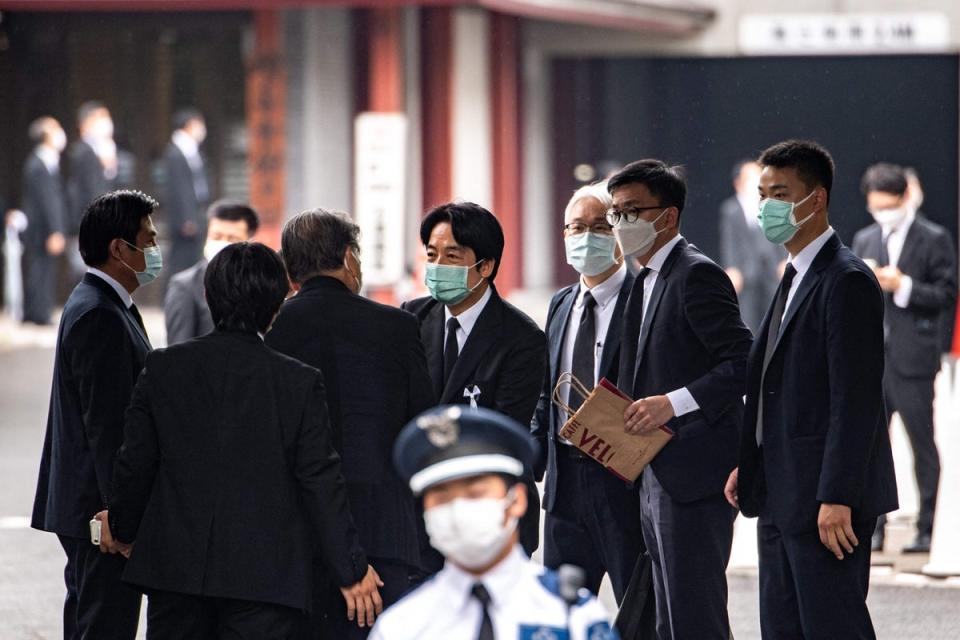Taiwan ‘does not have a so-called vice president,’ China says after official attends Shinzo Abe funeral
China has denounced the designation of Taiwan’s vice president and raised a complaint with Japan after he went on a visit to the country and was photographed at Shinzo Abe’s funeral.
Beijing raised a stinker with Tokyo on Tuesday by lodging “stern representations” and repeating its claim that the self-goverened, democratic territory was a part of China by saying that it “does not have a so-called vice president”.
Taiwanese vice president William Lai had gone on a private visit to Tokyo on Monday to pay his respects as a friend of the assassinated leader, a Japanese official said.
He was later photographed leaving the Zojoji temple in downtown Tokyo on Tuesday where Abe’s funeral was held.
“After the assassination of former Japanese prime minister Abe, the Taiwan authorities used the opportunity to engage in political manipulation,” Chinese foreign ministry’s spokesperson Wang Wenbin said at a news briefing in Beijing.
Mr Wenbin continued his harsh attack on Taiwan by saying: “It’s impossible this kind of scheming will succeed.”
Mr Lai became the senior-most official to visit Japan last week after bilateral ties between Tokyo and Taipei were called off in 1972. After breaking official ties with Taiwan, Japan had grown closer to Beijing.

But in recent times, the country has leaned closer to Taiwan and become its fierce supporter by backing its claim for self rule.
It has done so while underscoring the need for peace and stability in the Indo-Pacific region, which has seen expansion and dominance by China.
After resigning from the top job, Abe had voiced his support for Taiwan last year and had said that it and Japan had to keep a check on China, bolstering the breakaway nation’s claims for sovereignty and angering China in the process.
Taiwan had on Friday marked its own national tribute for Abe by lighting up the Taipei 101 skyscraper.
All government bodies and public schools were also asked to fly flags at half mast on Monday after orders issued by president Tsai Ing-Wen.
Ms Ing-Wen had also visited the Japanese embassy in Taipei on Monday to pay her respects.
“I feel pain and deep regret with the unfortunate death of former Japanese prime minister Abe, who had been my friend for more than 10 years and who was also a staunch friend of Taiwan,” Ms Ing-Wen had earlier said in a Facebook post on Friday.
Abe was shot in the back by a 41-year-old male suspect while addressing a rally on Friday, sending a wave of shock and grief across the world in a rare incidence of gun violence in Japan.
In its increasing display of military muscle, China announced it had carried out joint combat exercises and drills around Taiwan last week on Friday. It also warned the US against military collusion with Taiwan.
Beijing has fiercely guarded its position considering Taiwan as part of its national territory, despite Taipei’s decision of self rule taken in 1949.
In recent times, China has amped up its military exercises around Taiwan and flown a record number of warplanes into the nation’s airspace, violating its territorial integrity.


